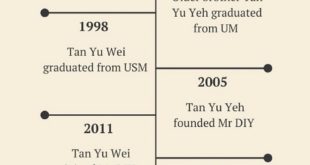
Sugarbook has once again stirred up heated discussions amongst netizens, starting with an infographic that the sugar dating platform publicly released to media sites last week.
By now, you probably know what the infographic was about, seeing as major news outlets across Malaysia were quick to publish the statistics.
Vulcan Post received those statistics too, but we decided to refrain from blindly publishing them. I’ll explain why below.
Before continuing though, I do want to preface that although our writers have the right to their own personal views about the app and lifestyle, Vulcan Post as a media brand isn’t against Sugarbook, its services, and its right to advertise as a registered business. Rather, what we’re opposing are the exploitative marketing and blind publicity of sugar dating, both of which are present in this debacle.
With the news having spread far and wide by now, we thought it was all the more important to bring up this discussion.
1. It’s A PR Stunt That Feels Exploitative
I think what rubbed me the wrong way first-off was that the infographic revealed what I felt should be P&C information.
I can’t confirm if this information was taken from initial user sign-ups, willingly given by users on their profiles, or if they answered a survey from Sugarbook that asked what university they were from.
While whether or not the students gave consent to having their university names revealed publicly is one issue, another is why Sugarbook even felt it was necessary to provide the university names in the first place, let alone how many students were from which.
What was the point of doing so? Who was this supposed to benefit?
Sugarbook claimed in the press release that the reason for the infographic was due to a 40% spike in sign-ups amongst students on Sugarbook from January 2021.
But the publishing of these unverified data almost seem to serve as an instigator for a FOMO reaction amongst students of those named universities.
Being that this was a marketing strategy for the team (or a PR stunt, as some may term it), perhaps the answer is obvious that this was on purpose to draw major attention.
With so many media covering it the moment it was out, that was achieved, alongside ruffling some feathers along the way.
2. It Could’ve Caused Unnecessary Conflict In Families & Amongst Peers
Something I can’t get off my mind is how the parents of students at the 10 universities are reacting to the news. No student names were publicised, but if I were a parent in this case, I would most probably be wondering if my child was one of those sugar babies.
For those who already live with abusive families (which may be why they turned to sugar dating in the first place), this could worsen the situation for them. They may either be punished severely or be victims of extortion by their own family, if it’s revealed that they’ve been receiving money but keeping it for themselves.
While we’ve yet to hear of such cases with regards to sugar dating specifically, denying that these outcomes are possible would be ignorant.
Furthermore, other students at the universities may now be wondering who among their peers is a sugar baby. This could lead to the shaming and bullying of certain students whom peers suspect to be a user of the sugar dating app.
Victims of bullying are then at risk of developing depression, ADHD, and becoming antisocial, amongst other things, all of which could negatively impact their personal and academic lives.
3. It’s An Irresponsible Promotion Of A Lifestyle That Isn’t For Everyone
Sugar dating is still a taboo topic not just in Malaysia or the East, but even in the West. Personally, I’m all for freedom of choice, but I believe that even this choice should come with a lot of understanding and weighing of pros and cons.
I strictly do not agree with the blatant promotion of the lifestyle to the general public. I believe that if it is to be promoted, it is on the basis that whatever the arrangement implies and its potential effects on one’s life should be made very clear.
Take the smoking lifestyle for example. It’s not publicly advertised or promoted for the sake of public health and wellness, so that people aren’t encouraged to pick it up.
When you see a cigarette pack being sold, you’re hit with visuals about the health risks of smoking so that you cannot claim ignorance over its effects. Because it’s also not publicly promoted, those who seek out the lifestyle are people who understand the risks, but decide to do it anyway.
However, sugar dating isn’t as understood a concept as smoking. Not everyone understands the full implications of sugar dating and the effects it can have on one’s mental and emotional health, not to mention their self-worth and confidence.
It feels irresponsible that a registered company has chosen to promote sugar dating as if it were a simple product or service that doesn’t have potentially long-lasting effects on the people involved.
4. It’s Marketing That’s Predatory Towards Students
Here lies the biggest issue of all with the entire situation. Sugarbook’s purpose to publish those statistics wasn’t just to showcase the sugar dating demographic in Malaysia.
It was also to encourage more students to sign up for the website as sugar babies. In the press release, founder and CEO Darren Chan even said this:
“Times are hard. Our platform provides the opportunity to find economic relief during these volatile times. Dating someone who is more successful or experienced comes with its perks, and financial incentives are just one of them. They get to connect with high-net-worth individuals as well as pursue career advancements.”
He used words like “economic relief”, “financial incentives” and “career advancements”, all of which serve little purpose but to sugarcoat the fact that sugar dating is still in fact women exchanging intimacy (whether sexual or non-sexual) for monetary rewards.
Marketing a lifestyle like this using such words is misleading, especially to students who may not be financially responsible or emotionally mature enough to explore the many different facets of sugar dating.
In many cases, those who sign up as sugar babies tend to already be vulnerable in certain aspects of their lives, be it mentally, financially, or emotionally. They’re now being misled into thinking that sugar dating will be their best problem-solver, because it’s portrayed as a glamorous lifestyle that’s all pros and no cons.
By looking up real-life experiences of sugar babies on the internet, you’d find that many of the cons listed tend to mention that they experience:
- Eventual loss of self-worth,
- Depression,
- Post-traumatic stress disorder (PTSD), and more.
We must state that while there is still a lack of research on the specific risks of being a sugar baby, various studies have been done to explore the dynamics and results of the sugar dating lifestyle.
Commonly, a sugar dating arrangement consists of an older, wealthier provider (usually a sugar daddy) and a younger beneficiary in need of money (sugar baby). Just a glance at the previous sentence should make it obvious the amounts of power imbalance such a relationship holds.
Therefore, to market it without any boundaries or clear awareness to young, vulnerable students comes off as unethical, even if a company has to make its dough.
-//-
Sugarbook has since been banned in Malaysia, but they’re still accessible via a different URL. This probably means that they will no longer be able to publicly advertise their services as easily, but there’s still another aspect to this controversy to address.
One reason why this marketing stunt spread so far and wide so quickly was because of the blind publicity many media sites gave it.
Vulcan Post conducted an interview with Darren back in 2017 on Sugarbook and its services. We wanted to have a neutral story on the concept by presenting Darren with common perceptions of the lifestyle, and present his perspective on it too. This way, readers were able to decide for themselves if this was a lifestyle for them, with an objective mindset.
Topics like these will put the spotlight on the media industry and how we choose to report on ongoing events. On our side, we hope to do our part and provide value and perspective in our content. We do not claim to always make the best choices, but we also do have our readers and audience who keep us accountable and in check.
- You can read our previous coverage on Sugarbook here.
Featured Image Credit: Darren Chan, founder and CEO of Sugarbook



